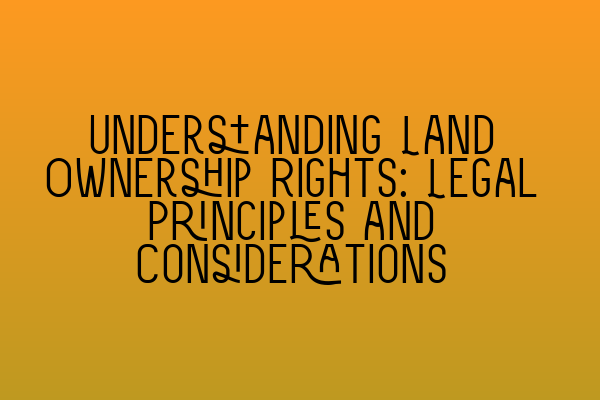Understanding Land Ownership Rights: Legal Principles and Considerations
As a property owner or someone looking to invest in real estate, it is crucial to have a clear understanding of land ownership rights. The legal principles and considerations surrounding land ownership can be complex, but with the right knowledge, you can navigate the landscape with confidence. In this article, we will delve into the key aspects of land ownership rights, shedding light on important legal concepts and helping you make more informed decisions.
Before we delve into the intricacies of land ownership, it’s important to note that property law can vary from one jurisdiction to another. Therefore, it’s always advisable to seek legal advice specific to your jurisdiction to ensure compliance and accurate understanding of land ownership rights in your area.
First and foremost, one of the fundamental principles of land ownership is that owning land grants you certain exclusive rights. These rights, commonly referred to as “bundle of rights,” include the right to use, possess, transfer, and exclude others from your property. Each of these rights carries its own legal implications and considerations.
The right to use your property allows you to occupy and utilize it for various purposes, such as residential, commercial, or agricultural. This right ensures that you have the freedom to enjoy your property within the boundaries set by local regulations and zoning ordinances. It’s important to familiarize yourself with local laws and regulations to ensure that your intended use of the property is compliant.
Possession, another crucial aspect of land ownership, refers to your legal right to physically possess and control the property. This means that as the owner, you have the authority to occupy the land and make decisions regarding its use, maintenance, and improvements. However, it’s important to note that certain restrictions, such as easements or leases, may limit your exclusive possession rights.
Transferring land ownership is also an essential aspect to consider. As a landowner, you have the right to transfer your ownership interest in the property to another party through various means, such as sale, gift, or inheritance. The transfer of land ownership involves legal documentation and processes that must be followed to ensure a valid and enforceable transaction. Consulting with a property solicitor can help navigate the complexities of transferring land ownership.
One of the most powerful rights associated with land ownership is the right to exclude others from your property. This means that, within the boundaries of the law, you have the authority to restrict access to your land and determine who can enter or use it. However, it’s important to be aware of certain exceptions, such as easements or public rights of way, which may allow limited access to your property by others.
In addition to understanding the bundle of rights associated with land ownership, it’s important to consider other legal principles that can impact your ownership rights. For example, statutory laws, such as zoning regulations and building codes, can dictate how you can use and develop your property. It’s crucial to be familiar with these laws to ensure compliance and avoid potential legal issues. Seeking professional advice from property law solicitors can help you navigate through these regulatory frameworks.
Moreover, it’s essential to be aware of potential risks and encumbrances on the property you intend to acquire. For instance, easements, liens, or restrictive covenants can impose limitations on your ownership rights. By conducting thorough due diligence and obtaining professional advice, you can identify and address any potential issues before finalizing the purchase.
It’s also worth mentioning that land ownership rights are not absolute and may be subject to government acquisition for public use, often referred to as eminent domain. In such cases, the government has the power to take private property for public purposes, provided that fair compensation is provided to the owner.
In conclusion, understanding land ownership rights is crucial for anyone involved in the property market. By familiarizing yourself with the bundle of rights associated with land ownership, as well as other legal principles and considerations, you can make informed decisions and protect your interests. Remember to seek professional advice when dealing with complex property transactions to ensure compliance and mitigate risks.
For further preparation regarding property law and land law, be sure to check out our related articles:
– SQE 1 Practice Exam Questions
– SQE 1 Practice Mocks FLK1 FLK2
– SQE 2 Preparation Courses
– SQE 1 Preparation Courses
– SRA SQE Exam Dates
Our team at SQE Property Law & Land Law is here to assist you with any legal matters concerning land ownership rights. Contact us today to discuss your specific situation and receive expert advice tailored to your needs.
Disclaimer: This article is for informational purposes only and does not constitute legal advice. Please consult with a qualified solicitor for professional advice specific to your situation.
